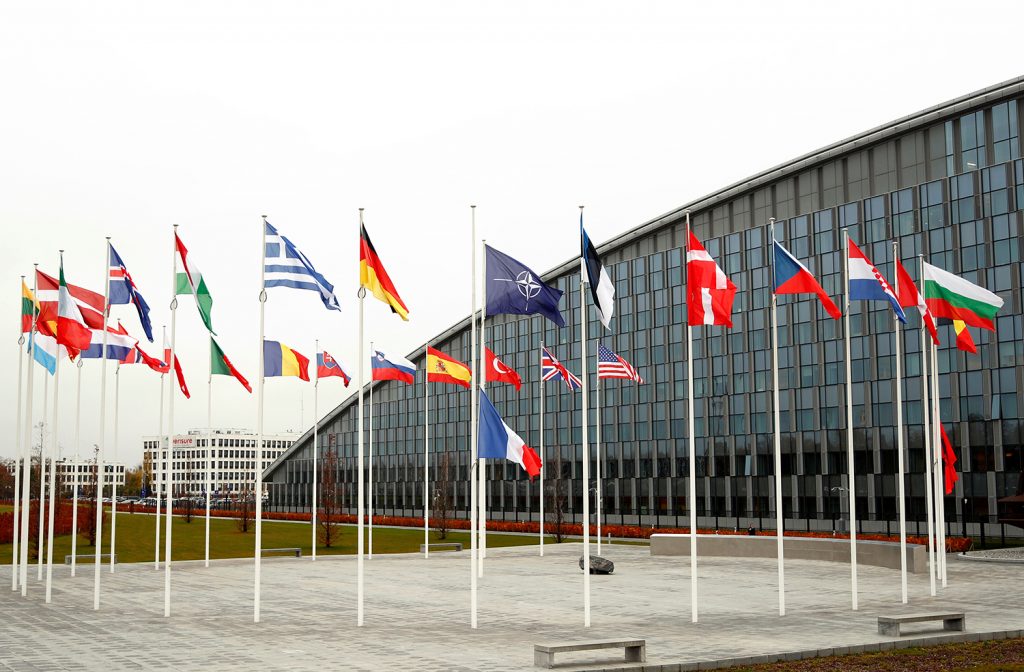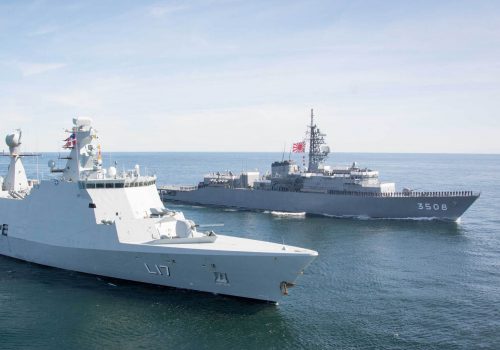Transatlantic democratic allies must begin working together to develop new technologies like cloud computing and artificial intelligence, to strengthen their collective defense, support democracy, and protect their societies.
Speakers from the National Security Commission on Artificial Intelligence (NSCAI), European Commission (EC), and NATO called for transatlantic allies to extend their cooperation to research and development of artificial intelligence at an event hosted by the Atlantic Council on October 28. The event marked one of the first public live discussions between Europe and the United States on transatlantic coalitions on artificial intelligence. “It is time for us to build another partnership: a partnership around artificial intelligence,” Eric Schmidt, chair of NSCAI and former CEO of Google, argued. Secretary Robert O. Work, vice chair of NSCAI and former deputy secretary of defense, agreed, adding “NATO is absolutely central to this [technological] competition.”
Ambassador Mircea Geoană, Deputy Secretary General of NATO, threw his support behind a common NATO approach to artificial intelligence, proclaiming that the Alliance’s democratic values and adaptability are crucial for allies to win the technological race in artificial intelligence as “in the end, this is something that would make us prevail.” Geoană, Work, and Schmidt were joined by Ambassador Kim Jørgensen, head of cabinet for European Commission Executive Vice-President Margrethe Vestager, who argued that the COVID-19 pandemic and other global challenges show that crises “don’t stop at the borders,” but require “a common approach,” that utilizes these new technologies and deep cooperation.
Here’s a quick look at what the speakers said about how a transatlantic alliance for artificial intelligence will impact the geopolitical landscape and protect democracy worldwide:
A transatlantic approach
- A strong democratic AI alliance: Schmidt argued that the partnership between the European Union and the United States has “provided extraordinary economic growth, military security, national security, and cultural enrichment that has benefitted all of us enormously.” But as China and other adversaries race for technological superiority, “a strong alliance among the democratic nations for this techno-economic competition” is needed, as proposed by the NSCAI in its Third Quarter Recommendations for the US government. The recommendations called for “expediting the responsible development of artificial intelligence by NATO and member states, resilient artificial intelligence partnerships,” and a Strategic Dialogue for Emerging Technologies with the EU. Schmidt considered artificial intelligence a “game-changer” for the EU and the United States and the most powerful tool for increasing prosperity and “expanding freedom.”
- True partners share values (and data): While AI may be a new area of focus for NATO, Work argued that deep transatlantic partnership will be key in keeping up with the technological competition. “We have to share our data, [just like] we have to share our values.” Geoană agreed, but also noted that NATO must continue to “make sure that we keep the right balance between the traditional way [of keeping] our deterrence and defense… while rapidly and systematically [making] the transition towards the new era and new technologies.” Geoană maintained that this balance is essential as NATO has been the “most successful alliance in human history” because “we kept our values… but also we kept always our technological edge.” Indeed, NATO has a crucial stake in transatlantic democracies winning the technological race “because the moment you lose this technological edge…then not only will the last seven decades of the transatlantic bond…be in jeopardy, but also a few centuries of Western domination in technology,” explained Geoană.
- It’s an opportunity for new partners, too: The challenge to compete on the technical stage is so overwhelming that relying only on an EU-US partnership may not be enough to counter adversaries. “This is why opening up to our like-minded, democratic partners from all over the world… who are sharing the same values” should be a priority, Geoană explained, identifying opportunities with Australia, Japan, and Korea. Work agreed that a “coalition of digital democracies” should be a priority. He noted that India is an attractive partner, especially as the United States and India signed a military agreement this week that joins the countries to share satellite data—which is intended to counter Chinese influence in the Indo-Pacific.
- Winner takes all: The advantages of winning the race to AI do not stop at defense capabilities, Jørgensen emphasized, but also show the potential technology “offers to make our economies more sustainable and to meet a wide range of societal needs.” The current COVID-19 pandemic, she added, has illustrated the benefits of EU-US cooperation on technologies like artificial intelligence, as they can “help us… to improve our health system and future responses to such [crises],” Jørgensen claimed.
Watch the full event
The global race to establish standards and norms
- Norms now for safe technology use later: The race for mastery of artificial intelligence will also have important implications for the rest of the world. Work warned that whichever country succeeds in the technological competition will see its values “reflected in the way the technology is used” around the world. Democratic nations need to take the lead in artificial intelligence as “we do not want the Chinese to be developing global norms and technical standards for artificial intelligence technologies.” Should Beijing win the race for AI, it “will use these technologies to surveil its population, to suppress minorities; they have no real concern over personal privacy… their values are much different.”
- A rules-based system by transatlantic norms: According to Work, joint EU-US work on artificial intelligence is “absolutely critical” to “shape artificial norms and technical standards” that respect freedom before China sets the rules. Geoană also agreed that democracies need to establish standards and norms for artificial intelligence use early to “keep our citizens safe and prosperous,” warning that “we have to bring all the arsenal, our toolboxes, our imagination, [and] our strengths together in this direction.”
- Bulk up for stronger AI standards: Jørgensen agreed that democratic allies and partners should set their priorities to “lead the development of technology and be at the forefront when it comes to setting the global standard.” Jørgensen floated tapping into partnerships with non-NATO countries like India, because “the larger the combined economic weight of our allied partners, the more effective we will be in promoting our standards.”
Off to the races: China and the West
- Beijing is catching up: Work warned that “China is catching up fairly quickly” to Western technological levels, “[but] the West is still ahead.” As China has made technological and artificial intelligence advancement a national priority, described Work, there’s “every reason” to believe that “they can be already significant peer competitors in this arena.” Work added that if China “wins” on a technological platform such as artificial intelligence or 5G, and if “we start using Chinese platforms as opposed to Western platforms, this will have all sorts of negative impacts on our society.”
- All the ingredients for supremacy: Geoană further cautioned that “for the first time in our history on technology, one competitor—China—has, at the same time, all the ingredients of global supremacy on technology,” said Geoană, adding that Beijing not only has the capacity to develop technology, but also a growing global technology market through its Belt and Road Initiative.
- Step one of the game plan: Work identified that China’s approach to smart cities—cities that use technology to connect different components of a city and collect data on its citizens and visitors—and surveillance technologies “furthers authoritarianism and violates personal privacy and civil liberties.” But establishing a “US-EU digital ecosystem,” with initiatives like building trusted cities that use AI and data consistent with democratic values, “would be very good for the long-term competition between democratic and authoritarian regimes.”
Harnessing transatlantic brain-power
- Humans matter: The NSCAI’s Blueprint for Artificial Intelligence Cooperation includes recommendations for transatlantic defense and security operations, joint research and development, data sharing, and innovation: but Schmidt stresses that talent acquisition comes first. “We need all the top brains that are available to us in all of the Atlantic Council countries, working to build platforms that have our values and commitments to protecting individual rights, restoring commercial competition built on fair rules, and strengthening defense alliances.” The most important objective, he added, is to “get the human capital that is available in Europe and in the United States” working toward research on artificial intelligence and setting technological norms and standards. “We are strong when we are innovating in these spaces and combined, we can build amazing platforms.” Work added that focusing on talent is “key to winning a long-term technical competition on artificial intelligence.”
- A transatlantic digital community: Geoană also argued that talent will be found within the triangular alliance—academia, government, and industry—as per the NSCAI’s recommendations. He advocated for a transatlantic digital community that would bring together the talent of NATO members’ universities, researchers, young entrepreneurs, startups, and governments. “Harnessing this synergy between the three pillars of our democratic society is not only smart in terms of business and adaptability, but it is also our main competitive advantage in our competition with our authoritarian rivals,” Geoană said.
This panel discussion was convened by the Atlantic Council’s GeoTech Center and Future Europe Initiative.
Katherine Walla is assistant director of editorial at the Atlantic Council.
Further reading:
Image: Flags of NATO member countries are seen at the Alliance headquarters in Brussels, Belgium, November 26, 2019. REUTERS/Francois Lenoir



